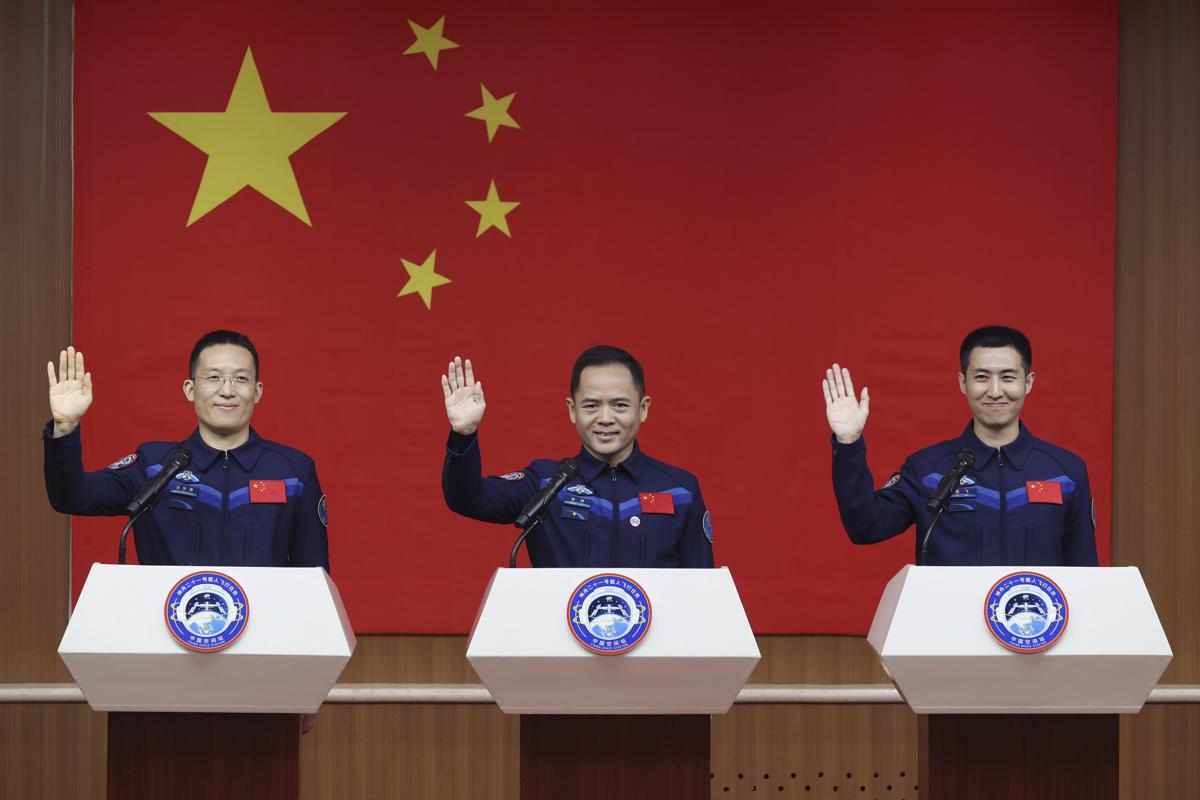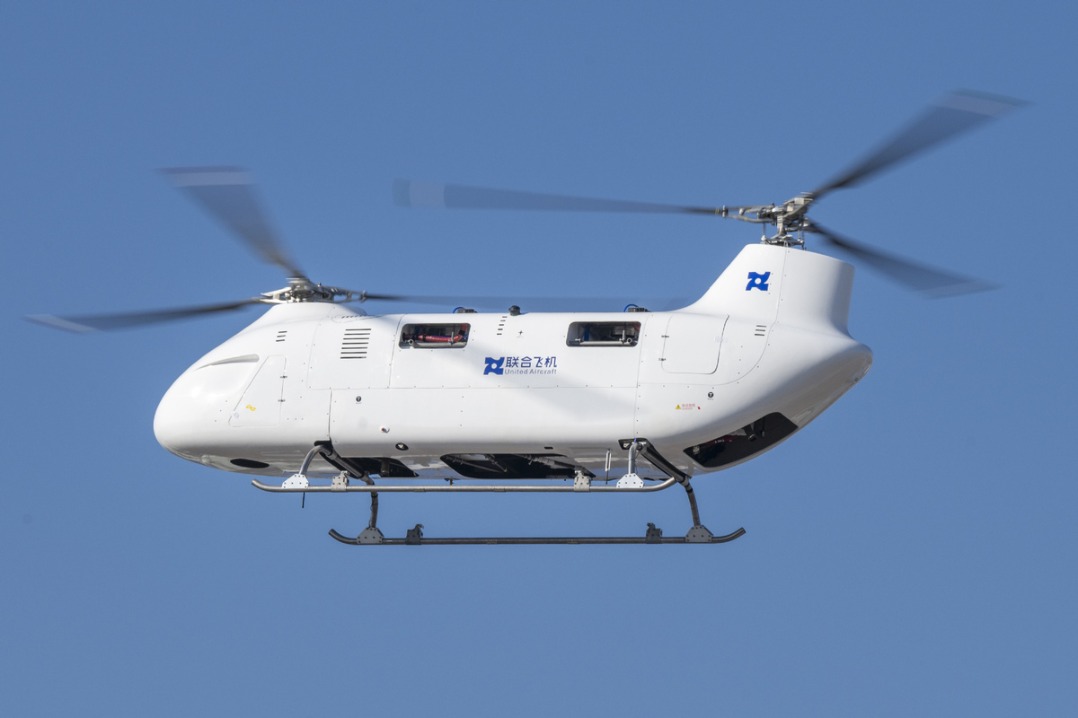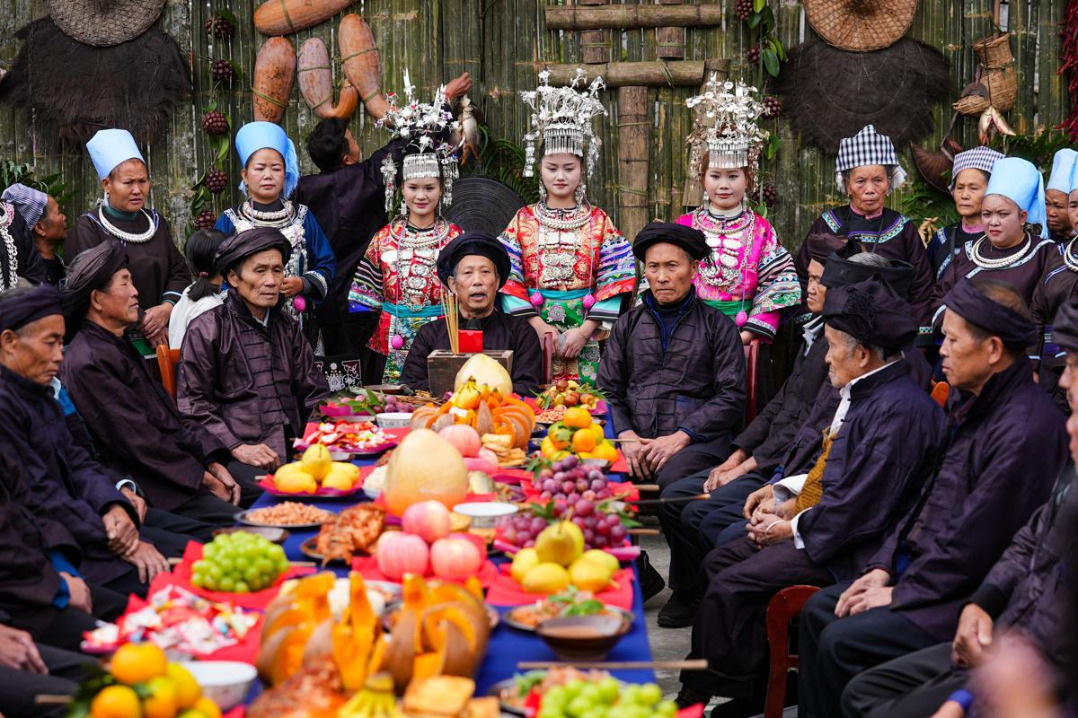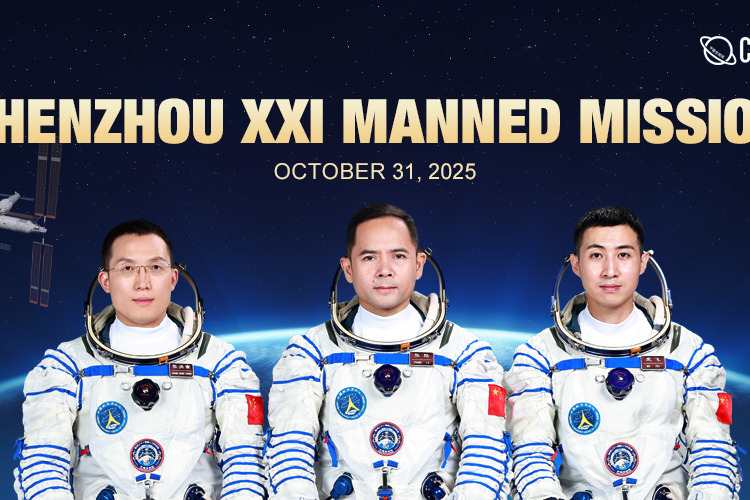Crew members ready for Shenzhou XXI mission
Mission: 27 new projects to be undertaken


China will launch three astronauts into low-Earth orbit on Friday night to carry out a crew shift onboard its Tiangong space station and undertake a host of scientific assignments, including the nation's first in-orbit experimentation on rodents.
A Long March 2F rocket, carrying the manned Shenzhou XXI spaceship, is scheduled to lift off at 11:44 pm on Friday from the Jiuquan Satellite Launch Center in northwestern China, Zhang Jingbo, a spokesman for the China Manned Space Agency, said at a news conference held on Thursday morning at the Jiuquan spaceport.
The Shenzhou XXI crew members, led by mission commander Senior Colonel Zhang Lu, 49, will take charge from their Shenzhou XX peers, who have been manning the space station for more than six months, the spokesman said.
The carrier rocket's propellant injection work is set to start at its service tower later on Thursday, while other prelaunch preparations are already underway, said the spokesman, who is also a senior engineer at the space agency.
"After the Shenzhou XXI spacecraft enters its preset orbital position, it will activate its rapid autonomous rendezvous-docking mode, and then take about three-and-a-half hours to approach and connect with the front port of the Tianhe core module," he said.
The Shenzhou XXI team is tasked with operating and maintaining the Tiangong space station during their six-month stay. This will be the second spaceflight for Zhang Lu, about 29 months after he returned from the Shenzhou XV mission. For his two teammates — spaceflight engineer Major Wu Fei and payload specialist Zhang Hongzhang — it will be their debut mission.
Wu, 32, will be the fourth Chinese spaceflight engineer to have reached orbit, after Colonel Zhu Yangzhu of the Shenzhou XVI mission, Lieutenant Colonel Wang Haoze of the Shenzhou XIX, and Colonel Wang Jie of the Shenzhou XX.
Wu will also become the youngest Chinese astronaut to have participated in a spaceflight, breaking the record held so long by Lieutenant Colonel Tang Shengjie of the Shenzhou XVII, who made his first journey into space in October 2023 at the age of 33.
Before joining the People's Liberation Army Astronaut Division in January 2021, Wu was an engineer at the China Academy of Space Technology in Beijing, specializing in spacecraft temperature control technology.
Zhang Hongzhang, 39, will become the second Chinese civilian to make it to outer space, as well as the second Chinese payload specialist to embark on a spaceflight, following Professor Gui Haichao from Beihang University in Beijing, who was part of the Shenzhou XVI mission.
He is also the first astronaut picked from the Chinese Academy of Sciences, the country's top research institution. His academic work is focused on critical materials and apparatus for advanced batteries.
In-orbit operations
During their orbital stay, the Shenzhou XXI astronauts will carry out a host of assignments such as conducting scientific experiments and applications, undertaking spacewalks to install space debris shield equipment and other instruments, deploying and retrieving devices from outside the space station, and performing science lectures and other public-benefit activities, according to the CMSA spokesman.
Specifically, the astronauts are set to open 27 new scientific and technological projects for in-depth and systematic research across multiple fields, including space life sciences and biotechnology, space medicine, space materials science, microgravity fluid physics and combustion, and new spacecraft technologies.
The spokesman said the Shenzhou XXI crew will perform the country's first in-orbit experimentation on rodents. Four mice — two females and two males — will fly onboard the spacecraft to the Tiangong space station, where the impact of the new environment, which features weightlessness and enclosed space, on their behavioral patterns will be observed, he said.
After the mission, the mice will return to Earth with the astronauts for further observations, including changes in their stress responses and multiple tissue and organ adaptations following their exposure to space, the spokesman added.
Crewed outpost
The Tiangong, which was completed in late 2022, is currently the only operating space station independently run by a single nation. It orbits Earth at an altitude of about 400 kilometers.
The space station has three permanent components — the Tianhe core module and two large science lab modules called the Wentian and the Mengtian. It is currently connected with two visiting spacecraft, the Shenzhou XX crew ship and the Tianzhou 9 cargo ship.
With an overall weight of about 100 metric tons, the Tiangong is one of the largest and most complex structures ever set up in space by humans.
The orbital outpost has been manned by the Shenzhou XX astronauts — mission commander Senior Colonel Chen Dong, Colonel Chen Zhongrui and Colonel Wang Jie — since their arrival in late April.
The astronauts have conducted many scientific experiments and technological tests, as well as four spacewalks. They are scheduled to fly back to Earth after spending several days with their successors for handover work, the CMSA spokesman said.
With the Shenzhou XX mission, Chen Dong has become the first Chinese astronaut to spend more than 400 days in outer space and make six spacewalks, the spokesman said.
- Crew members ready for Shenzhou XXI mission
- China urges Philippines to 'mend its ways' over South China Sea provocations
- Key things to know about formulation of recommendations for China's 15th five-year plan
- Hainan striving to be a 'low-carbon island'
- Chinese-German metals company opens innovation center in Shandong province
- Automaker leverages premium audio to ride China's intelligent vehicle wave





































